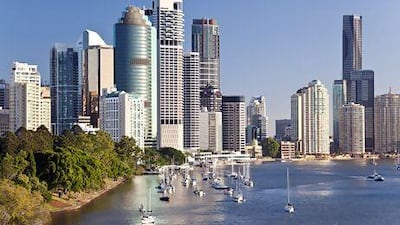Australia's east coast tends to take a major chunk of the tourism pie away from the rest of the country, and Brisbane might be considered one of the favourite reasons for this. Located in Queensland, the city has the lure of the Pacific Ocean and outdoor sports for adventure-seekers. It also has a state-of-the-art convention centre that attracts some of the largest conferences and gatherings in the country.
Key points about business travel to Brisbane.
Airlines to Brisbane: Etihad Airways, Emirates Airline, Jet Airways and Qantas Airways connect from Abu Dhabi and Dubai.
Airport: The international terminal at Brisbane Airport (Iata code: BNE) opened in 1995.
An airport hotel: Novotel Brisbane Airport. A standard room starts at US$243.73 (Dh895) per night, tax included, as per the hotel website.
A downtown hotel: Rendezvous Hotel Brisbane Anzac Square in the commercial business district. Standard rooms start from A$152.
Cost of transportation from airport to city centre: A one-way ticket on Airtrain from Brisbane Airport to the city centre will cost about A$15.
Conference centre: Brisbane Conference and Exhibition Centre opened in the city's tourist and business hub South Bank in 1995. The building is 450 metres in length. Since then it has expanded a few times. In January last year, the centre opened a facility on Grey Street with two auditoriums and aims to cater to smaller meetings with up to 8,000 delegates.
Power restaurant: Urbane. Entrées start at A$28; mains range from A$38 to A$48 and dessert from A$18.
Work/business visa costs: A$110 to A$365 for various nationalities.
Currency/conversion rate: A$1 = Dh3.79
Main businesses in town: Insurance companies, mining, energy, banking and retail. Among the top public companies are Suncorp Metway, Queensland's large listed bank, Lihir Gold, Australia's second-largest gold producer, and Arrow Energy.
Things to do at night: Explore local haunts such as Three Monkeys Coffee House and Fatboy's Cafe, try indoor rock climbing at Urban Climb, and enjoy live music at Tivoli.

